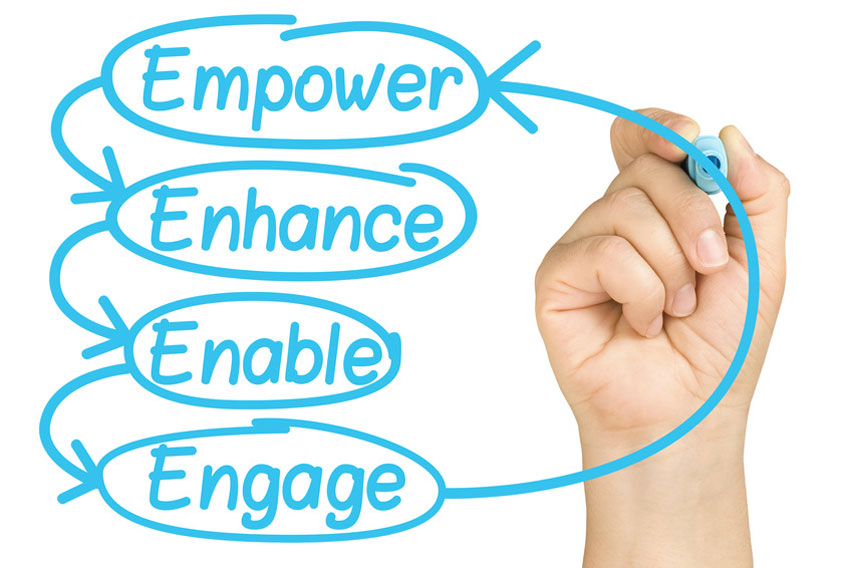Part Five in our series on the Seven Commitment Traits and coaching leaders.
In our initial articles, we have looked at how to coach several of the Seven Influence Traits. Today, we move to the fifth of the Seven Influence Traits™ - Empowerment.
You, The Empowerment Coach
Empowering others is the key activity that sets a leader apart from a mere doer. A leader is able to use influence to enable others to accomplish the objective at hand.
Here is how you can help your clients empower others.
1. Do they value people?
In order to be a strong empowerer, the leader must fundamentally value people. Leaders understand the importance of a team and see the values the individual people bring to the team.
You can help assess your client’s valuation of people by observing his/her interactions and asking questions. Empowerers see that:
- People can change. While change is not easy, it is possible for individuals to change course, attitudes and behavior. This doesn’t mean that the process of leading them to this will be easy. When coaching or consulting with your clients, help them to see that transforming people, not results, is the prime investment they should make. Help your clients see that the people they lead are worth investing in towards change.
- Every person is valuable. An empowerer understands that every person has a strength which can contribute to the team. That doesn’t mean that every person should remain in his/her current role, and sometimes the greatest thing a leader can do is to free a person to pursue his/her contribution through strength elsewhere. But it is not empowering to dismiss the individual as having no inherent value or strengths. If this behavior is observed in a client, it must be questioned and challenged.
- Effective leaders have a positive regard for people. This doesn’t require converting your introverted clients into raging extroverts. Instead, teach them how to positively show their regard for others in the unique ways in which they may honor and dignify others.
- Visibly demonstrating the value of others is vital. How does your client interact with others to show value? Do they look them in the eye when speaking to them? Do they practice good active listening habits? Are they dismissive or aloof of others? Coaching them in how behaviors are perceived is crucial to the personal growth of the leader.
2. Do they trust others?
One will never empower others beyond where they trust them. A primary deterrent to trust is rooted in two elements: pride and fear.
Pride says, “I am the most valuable person here, and NO ONE will be able to do this as well as I can.” Rarely is that true. Even if someone can do something 80% as well as you, you should start empowering them through delegation.
Fear says, “If I hand this task to you, something may go wrong. By keeping it to myself, I can control the outcome.” Again, rarely is this true. Most of the control we feel we possess in life is an illusion. Ultimately handing off vital tasks to others will produce a better outcome because everything is not bottle-necked under the limitations of the leader.
When you have a client who has difficulty trusting others, you must probe and get to the root of the distrust. This can be a painful and personal exercise, but one in which the consultant or coach must engage the client. Past life experiences are often at the root of these views. A good coach or consultant acts as an unofficial counselor in this regard, helping the client to see not all situations and all people are equivalent to past experiences and personal encounters.
3. Do they show patience?
Empowering others is often the long road to accomplishment. It is often much faster to initially just do it yourself than bringing someone along in the process. But that longer road can become an eight-lane autobahn if you are patient. A team of empowered people will always outperform a single superstar because of mere time and energy constraints.
You can help your clients understand this is a long haul process. When you observe them fail to delegate, address it with them. Remind them that 51+% of any leader’s job is raising up new leaders, not just doing the work.
4. Do they exhibit humility?
The greatest leaders are often unsung humble people who don’t get immediately recognized in the press or buzz of leadership publications. They do the quiet, unseen, unglamorous work of raising up other servant leaders, yet they are creating incredible momentum within their organization.
The shift in empowerment is best seen when leaders stop asking, “How can I succeed?” to asking, “How can I help others succeed?” This is the shift I call From Success to Significance.
A key sign of humility is accepting the ideas of others for serious consideration. Ask your clients what ideas they have implemented that weren’t their own. If they have difficulty answering this question, they might need some work in this area.
A final sign of empowering humility is the willingness to submit oneself to new experiences. If you see someone fearful to try something new - for example, a team building experience where he/she stands on the sidelines - this points to the fear and pride combination we pointed out earlier.
Start Catalyzing Your Client’s Ability to Empower Others
The empowerment influence trait is coachable. Coaching this trait, however, will require a willingness for you, the coach or consultant, to probe and to press into the personal character faults, fear and pride that your client might possess more so than other traits. You must be brave and be willing to engage in this for your client’s ultimate benefit, even if it makes him/her uncomfortable in the moment. Ultimately, I have found clients are grateful for the input.
Coaching each of the influence traits provides you an area in which to grow the influence of your clients. For more resources on coaching towards empowerment or coaching for improvement in the six other traits, visit Karen-Keller.com





